- Home
- Various Authors
Mortal Crimes 2
Mortal Crimes 2 Read online
All works in this collection are copyrighted by their respective authors.
Published by Steel Magnolia Press.
IMPROPER INFLUENCE
MELISSA F MILLER
THE DEVIL’S CAULDRON
MICHAEL WALLACE
ULTIMATE JUSTICE
M A COMLEY
DARK SIDE OF THE MOON
J CARSON BLACK
NIGHT GAME
CAROL DAVIS LUCE
POE
BRETT BATTLES & ROBERT GREGORY BROWNE
SECTOR C
PHOENIX SULLIVAN
IMPROPER INFLUENCE
(A SASHA McCANDLESS NOVEL)
MELISSA F MILLER
This book is a work of fiction. Names, characters, places, and incidents either are the product of the author’s imagination or are used fictitiously. Any resemblance to actual persons, living or dead, is entirely coincidental.
Copyright © 2013 Melissa F. Miller
All rights reserved.
Brown Street Books.
For more information about the author,
please visit http://www.melissafmiller.com.
Cover design by Clarissa Yeo
Three things shine before the world and cannot be hidden.
They are the moon, the sun, and the truth[.]
Pokala Lakshmi Narasu
The Essence of Buddhism (1907)
Chapter One
Bodhi King stared down at the cold, rigid body of Jasmine Courtland. She had a tangle of red curls, long dancer’s legs, and a smattering of freckles on her pale skin. No wounds, no evidence of disease, nothing to suggest she was anything other than a perfectly healthy twenty-two year old. Aside from the obvious fact that she was dead.
According to the report from the EMTs, the recent college graduate had complained of a fever and fatigue for two days. She’d been reading a novel beside her parents’ swimming pool earlier in the day. When her father came out to see if she wanted to join him for lunch, he found her unresponsive body on the ground next to her lounge chair.
By rights it should have presented to Bodhi, the forensic pathologist who caught the case, as a puzzling and bizarre death. Unfortunately, it did not.
He already knew what he’d find when he autopsied her heart: the cause of death would be myocarditis, an infection of the heart.
Myocarditis was rarely contracted by people living in the United States and was even more rarely fatal. Yet it had been the cause of death in two other otherwise healthy young women in Allegheny County in the past week and a half. Once he finished his exam and signed her death certificate, Jasmine Courtland would officially become the third woman in Pittsburgh to die as a result of myocarditis in the past ten days, joining Nina Penrose and Christa Taylor.
The media would decry her death as inexplicable, a statistical anomaly.
But was it?
He turned away from the corpse toward the laptop sitting on the stainless steel table behind him. It was his practice to type up contemporaneous notes during the autopsies he performed. He typed a few lines into the file labeled ‘Courtland, Jasmine,’ and then clicked on his directory of notes to cross-reference the Penrose and Taylor files, hoping some common fact would jump out at him, connecting the three apparently unrelated deaths.
Bodhi blinked. He scanned the list of files, and his pulse quickened. ‘Penrose, Nina’ and ‘Taylor, Christa’ were not there.
“Not possible,” he muttered to himself.
He pulled up the search feature and searched his entire hard drive for each of the files in turn. The search box informed him “No files found.”
His heart thumped in his chest. His hovered his fingers over the keyboard, but they shook. So he took a moment to slow his breathing and steady his hands before he repeated the search—this time tapping into the official database of cases maintained on the network.
Although he kept a local copy of each of his active cases on his laptop because the network was notoriously slow, he was meticulous about always saving to both his hard drive and the network, just in case his laptop died. He could always pull the files down from the network.
He waited patiently as the hourglass spun lazily on his screen, letting him know the computer was working on his request. It spun for a long time. So long, in fact, that his anxiety fizzled into boredom. At last, the network coughed up the results of his search.
No files found.
*
He raced from the exam room to his small, uncluttered office. Every horizontal surface was clear. The only personal touch was a square, wooden box filled with smooth rocks and white sand that he raked when he needed to clear his mind.
He crouched and pulled open the lowest drawer of the metal filing cabinet on which the rock garden sat. He removed the top notebook from a stack of composition notebooks. Squatting beside the cabinet, he opened it and thumbed through the pages.
A frown creased his lips, and he turned the pages faster, running each sheet between his finger and thumb. He reached the last page and closed the notebook then turned it over to examine the back cover: “August 3, 2012—March 18, 2013” was written across the back in black marker.
Wrong notebook. The current one should have been on the top.
He removed the entire stack from the drawer and flipped through it, consciously slowing his breathing. The rest of the notebooks were in reverse chronological order. None was out of place or missing. But his current notebook was gone, and with it, the entries he’d made when he’d autopsied Nina Penrose and Christa Taylor.
Although he maintained his official records in electronic format, he also kept handwritten journals, where he recorded his personal thoughts and feelings about his cases. The entries were his way of honoring the lives of the dead who passed through his hands. He jotted down the thoughts that flitted through his consciousness during autopsies, capturing details that suggested the intimacies and intricacies of life, like a tribal tattoo, stretch marks lining a mother’s stomach, old surgical scars, or calloused fingertips—were they the result of manual labor or hours of guitar playing?
He doubted the passages he’d written about the dead young women would hold any forensic value, anyway, but with his electronic files lost in the ether, he’d wanted to check. The fact that his computer records were missing was strange and inconvenient, but he imagined they could be reconstructed by the information technology specialists. But the loss—no, call it what it was, the theft—of his private journals felt like a very personal violation.
He replaced the notebooks and rocked back on his heels.
Saul David passed by his open door.
“Hey, Bodhi, what did the Buddhist coroner write down for the cause of death?”
“Life,” he responded automatically, providing the punch line to his colleague’s favorite joke and closing the drawer.
Saul’s chuckle floated down the hallway behind him.
Bodhi stood and reached for the small wooden rake resting against the corner of the wooden box. As he raked curved lines around the rocks and through the sand, he took note of two unfamiliar feelings coursing through his body: burning anger and queasy fear.
Chapter Two
Sasha McCandless smiled patiently at the attorney sitting on the other side of the highly polished conference room table. She waited while he pawed through his pile of manila folders, each neatly labeled and containing a single exhibit.
He cleared his throat but kept his eyes down on the papers in front of him. Finally, he said, “Let’s go off the record.”
The court reporter’s fingers stopped moving. She rolled her neck and picked up her copy of sports section of the Pittsburgh Post-Gazette. She folded it in half lengthwise and turned her attention from the attorney squabbling to
local hockey coverage.
Chip Clark cleared his throat again and steepled his fingers. He kept his voice even but gave Sasha puppy dog eyes, pleading with her not to embarrass him.
“If your client would just answer the questions, Sasha. These subjects are within his knowledge—”
Sasha cut him off right there. “Chip, come on. You noticed his deposition in his personal capacity. If you wanted to depose a corporate representative, you should have issued a 30(b)(6) notice. You know it, and I know it. Mr. Nelson is here to answer questions regarding his personal knowledge about the contract between VitaMight and Greenway Pharmacies, and nothing further.” She flashed her adversary a tight smile and watched his face turn purple.
“Sasha, be reasonable.”
“I am being reasonable. You don’t get to choose the corporate representative; VitaMight does. And I’ll tell you right now, they wouldn’t have sent Mr. Nelson. So, if you have any more questions for Mr. Nelson, ask them. If you’re going to keep asking questions that can only be answered by a corporate representative, we’ll shut this deposition down and call it a day. I’m sure Mr. Nelson would like to get home in time to catch the start of the Penguins’ game, right, Alex?”
“Hmm?” Sasha’s witness, apparently bored by the back and forth between the lawyers was craning his neck to read the front page of the court reporter’s newspaper upside down on the table. He turned to face her. “Sorry. What did you say?”
She gave him a long, meaningful look that said pay attention.
Chip squared his shoulders and took one last shot at bullying her. “I guess we’ll have to call the judge then.”
Sasha stopped herself from laughing aloud at the empty threat, but just barely.
“Be my guest. Here, do you want me to get an outside line for you?” She pulled the star-shaped phone toward her. “I’m sure Judge Sawyer would be delighted to address this issue on a Friday afternoon.”
Chip stared at her.
She stared back.
The court reporter yawned, and Alex Nelson kept reading her newspaper.
“Back on the record,” Chip said, finally.
Alex looked up from the paper and folded his hands in front of him—the very picture of an attentive, dutiful witness.
The court reporter dropped the sports section and hovered her fingers over her keys, ready to resume her silent, rapid keystrokes whenever Chip resumed his idiotic line of questioning.
The room was still for a long moment.
“I have no further questions,” Chip said.
He opened his briefcase, snapping the clasps with unnecessary force, and shoved his meticulous piles of papers into it in a haphazard heap.
“Are you gonna want both minuscript and full?” the court reporter asked, unperturbed by the awkward end to the deposition.
“Yes,” Chip said. Then he snapped his briefcase close and walked out of the room without another word.
“Friendly guy,” the court reporter observed. “What about you?”
“Just an electronic copy, expedited, please,” Sasha said, swallowing a laugh at Chip’s hurried exit.
The electronic version of the deposition transcript would contain both the full-sized version and the minuscript, condensed to fit four pages on a single sheet of paper. It would give her everything she needed and help her in her ongoing quest to avoid dying in an avalanche of paper someday.
“Sure thing.”
Sasha gathered her own papers into a stack while the court reporter and Alex exchanged views about the Penguins’ latest acquisition—a hot new goaltender.
“You did great,” she lied, walking Alex to the door.
He was a nervous witness and she’d spent two full days preparing him not to volunteer information, not to guess, and to pay attention. But he seemed to be almost uncoachable. Chip’s error had been their saving grace. If he’d properly noticed the deposition of corporate representative and the company had produced Alex, she would have had a mess on her hands. As it was, Alex mangled the handful of questions that she’d allowed Chip to ask.
Alex stopped in the doorway and beamed at her. The tension left his shoulders, and she felt a bit of sympathy for him. Everyone hated being deposed, and most people were bad at it. He was a business guy, not a lawyer.
“Make sure you tell Harper that, now,” he said, shaking her hand.
“Oh, I’ll definitely be giving the General Counsel a report,” she said.
Sasha’s assessment would be more honest than the glad-handing Alex had just received, but she’d be sure to focus on the positives. Harper Roberts was a worrier. It wouldn’t do to feed that worry—not over a case that she’d almost certainly win on summary judgment, especially now that discovery was closed and old Chip had neglected to depose a corporate representative.
Alex smiled. “Thanks. You take care.”
“I’ll walk you out,” she said.
“Oh, no need. I’m going to pop in and get a brownie downstairs,” he said.
Ordinarily, she would have insisted, but walking beside Alex made Sasha feel like she was part of a circus act.
He was six-feet, seven-inches tall. She was not quite five feet. Her neck would be sore from peering up at him before they reached the coffee shop on the first floor.
“Okay, then have a good weekend.”
He raised a hand in salute and pushed through the door.
She turned back to the court reporter, who had packed up her equipment and was shoving her newspaper into her large, vinyl purse.
“Are you all set?” Sasha asked.
“Yep.” The woman gave Sasha a friendly smile. “Go, Pens!”
Sasha smiled back and held the door open for her.
*
After the court reporter left, Sasha poked her head into Naya’s office, but her legal assistant was nowhere to be seen. She pulled Naya’s door shut and returned to her own office to check her messages and see whether her email in-box had exploded during the deposition.
She was composing an email to Harper, when Naya appeared in her doorway, holding a mug of coffee in her hand.
“How’d it go?” she asked, crossing the room and depositing the mug on Sasha’s desk.
“For me?” Sasha asked, distracted by the smell of Jake’s dark roast.
Naya nodded, a wry smile on her lips. “Who else? I know you must’ve been jonesing in there. What’s it been—four hours?”
“At least,” Sasha agreed. “Bless your cranky heart,” she said, raising the mug in Naya’s direction before taking a drink.
“You need to try Champion Fuel,” Naya said.
“Who what now?”
“Champion Fuel. Seriously, Mac, do you live under a rock? Hot new energy drink? Official fuel of the Pittsburgh Penguins? Brand-new bottling facility on the South Side? Ringing any bells?”
Sasha shook her head. “Sorry. Does it taste like coffee?”
“No.”
“Then what use would I have for it?”
“Point taken,” Naya said, dropping herself into Sasha’s guest chair. “So, the deposition—how’d it go?”
Sasha shrugged and sipped her coffee.
“Alex was shaping up to be a disaster, but I held Clark’s feet to the fire and told him no 30(b)(6) notice, no questions outside Alex’s personal knowledge.”
Naya laughed. “And Alex’s personal knowledge regarding sub-paragraph 16(g)(iii) of the distribution agreement would be … exactly nothing?”
“Exactly. He didn’t negotiate that agreement. He didn’t even work for VitaMight when it was signed. The sales to Greenway just happened to get shuffled into his department after VitaMight sold off the herbal side of the business. So, despite his best efforts to help the other side, we should be able to get the case kicked on summary judgment.”
A slow, satisfied smile spread across Naya’s lips. “Sweet.”
Sasha had noticed Naya’s interest in the strategy underlying their cases—already strong—had grown since she’
d been accepted to law school.
Naya was going to excel, Sasha knew. The question was how Sasha was going to run the office without her.
She realized Naya was staring at her.
“What are you thinking?” Naya asked.
“Nothing.”
She shook off her unproductive worry. She’d run the office singlehandedly before Naya had joined her; she could do it again if need be.
“Okay. It’s almost five. Do you have time to grab a drink?”
The desk phone rang before Sasha could answer. Naya craned her neck and leaned across the desk to read the display.
“It’s the Prescott switchboard. Want me to get it?”
Sasha shook her head and hit the speaker button.
“Sasha McCandless.”
“Sasha, Garrett English here. How’ve you been?”
The overly jovial voice on the other end of the phone triggered an unfortunate image of her former coworker. It was the summer of 2006, and Sasha and Garrett—along with handful of other rising stars—had been invited to a sailing party on the head of the litigation department’s boat. The party was for the benefit of that summer’s year’s crop of summer associates—law students who were paid an obscene amount of money and given a sanitized glimpse of what life as a Prescott & Talbott attorney could be. High-profile cases for Fortune 100 clients. Gourmet meals. Black tie parties. Intimate dinners in partner-owned mansions. And sailing on yachts. Sasha called them TCBY events: This. Could. Be. Yours!
Of course, none of it would be theirs. Not unless and until the new recruits survived a solid decade or more of mind-numbing abuse.
But, that day, on Noah Peterson’s yacht, Sasha and Garrett’s job was to act like they spent all their weekends sailing down the Allegheny River with multi-millionaire partners, and not chained to their desks from sunrise until the Downtown restaurants closed and Pittsburgh rolled up its sidewalks.
Garrett, unfortunately, had gotten progressively greener the longer they’d bobbed along the river. And, then, as Noah regaled them with a story about challenging counsel to a fistfight during a deposition, and Sasha widened her eyes as if she hadn’t heard this embellished story at least two dozen times, Garrett turned to the summer associate nursing a Corona next to him and said, “You don’t want to mess with Noah!” in that same cheerful voice.

 Lady Ambleforth's Afternoon Adventure by Ann Lethbridge, Barbara Monajem, Annie Burrows, Elaine Golden, Julia Justiss and Louise Allen
Lady Ambleforth's Afternoon Adventure by Ann Lethbridge, Barbara Monajem, Annie Burrows, Elaine Golden, Julia Justiss and Louise Allen Gods & Mortals
Gods & Mortals St. Somewhere Journal, July 2013
St. Somewhere Journal, July 2013 firstwriter.com First Short Story Anthology
firstwriter.com First Short Story Anthology Warcry: The Anthology
Warcry: The Anthology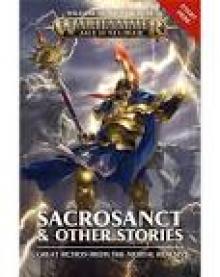 Sacrosanct & Other Stories
Sacrosanct & Other Stories Ultimate Heroes Collection
Ultimate Heroes Collection Cthulhu Deep Down Under Volume 2
Cthulhu Deep Down Under Volume 2 Erotic Classics II
Erotic Classics II Dynasties: The Elliotts, Books 1-6
Dynasties: The Elliotts, Books 1-6 Dynasties:The Elliots, Books 7-12
Dynasties:The Elliots, Books 7-12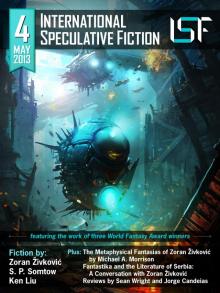 International Speculative Fiction #4
International Speculative Fiction #4 Fyreslayers
Fyreslayers One Night In Collection
One Night In Collection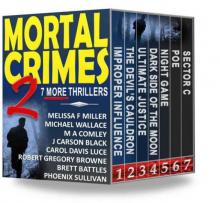 Mortal Crimes 2
Mortal Crimes 2 Some of the Best from Tor.com
Some of the Best from Tor.com Howl & Growl: A Paranormal Romance Boxed Set
Howl & Growl: A Paranormal Romance Boxed Set The Conan Compendium
The Conan Compendium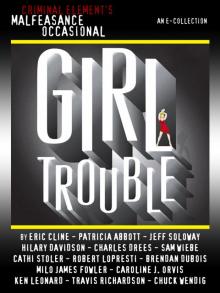 The Malfeasance Occasional
The Malfeasance Occasional Brides of Penhally Bay - Vol 4
Brides of Penhally Bay - Vol 4 Brides of Penhally Bay - Vol 2
Brides of Penhally Bay - Vol 2 Brides of Penhally Bay - Vol 1
Brides of Penhally Bay - Vol 1 School's in Session
School's in Session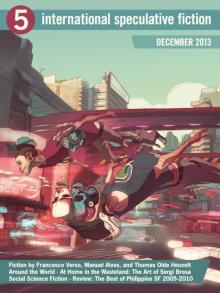 International Speculative Fiction #5
International Speculative Fiction #5 Erotic Classics I
Erotic Classics I Legends: Stories in Honor of David Gemmell
Legends: Stories in Honor of David Gemmell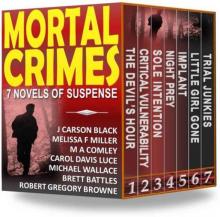 Mortal Crimes 1
Mortal Crimes 1 The Classic Children's Literature Collection: 39 Classic Novels
The Classic Children's Literature Collection: 39 Classic Novels Don't Read in the Closet volume one
Don't Read in the Closet volume one Some of the Best from Tor.com: 2014: A Tor.Com Original
Some of the Best from Tor.com: 2014: A Tor.Com Original The Fitzwarren Inheritance
The Fitzwarren Inheritance All Things Zombie: Chronology of the Apocalypse
All Things Zombie: Chronology of the Apocalypse Hammer and Bolter - Issue 12
Hammer and Bolter - Issue 12 Kiss Kiss
Kiss Kiss Dog Stories
Dog Stories Bad Blood Collection
Bad Blood Collection